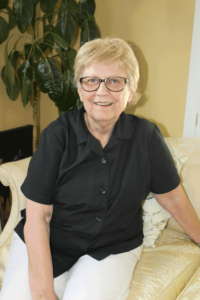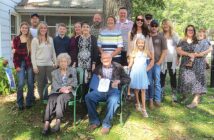A collection of letters from a woman of the 21st century to 34 nameless women of Bible times is being released this week. “Dear Mrs. Noah: Letters to Unnamed Women of the Bible” by Chester resident Roberta M. Damon, gives appropriate names and new identities to women familiar to readers of Scripture in her latest published work.
Some women whose stories are familiar, but were previously not known by name: Samson’s mother is named Salome (from the Hebrew “shalom,” meaning “peace”). Noah’s wife is named April (possibly from the Latin “Aprilis,” suggesting “open to the sun”). Job’s wife is named Dolores (from the Latin “delorem,” meaning pain and sorrow”).
The premise of the book is that without a name, a person has no identity. Unnamed Bible women are known by some event (“the woman at the well,” “the widow’s mite”) by their relationship to a man (Peter’s mother-in-law, Job’s wife), or by some physical condition (“the woman bent over double,” “the woman with the issue of blood”).
“I wrote this for the joy of writing,” Damon said in an e-mail. “So often we think of all things biblical as deadly dull. No so. The unnamed Bible women all have fascinating stories. I took great pleasure in putting a new twist on some of them.”
Damon’s acknowledgments include gratitude to Sandra Bollinger, who laughed when she was forced to listen to the chapter about Mrs. Noah. Deborah Edgar was teary-eyed over the letter to the woman at the well. Jim Williams’ Bible study class listened to each one upon completion, and Damon reports they laughed in all the right places.
Damon toyed with the idea of the book for more than a year. She said the actual writing did not take long. “My process was simple. I started with the biblical material and then imagined what a woman might have been thinking and feeling in that particular setting.” She thought about; in one case how being known as the “woman having an issue of blood twelve years” might have felt. “I have long been interested in women’s concerns,” said Damon. “Even theological students and professors rarely question the mores which dictated how women were overlooked, demeaned, or even abused in all those cultures we lump together as ‘Bible times.’”
Damon’s reflections at the end of each letter were designed to prompt the reader to reflect on issues relevant in today’s world. These questions can be used for small group discussion or personal pondering.
“A person with no name has no identity–no voice,” she stated. “The illustrations by my beautiful and talented granddaughter, Melissa, show each woman robed and without a face. The sketches enhance the text, bringing each story to life.”
Damon hopes readers will be informed and entertained by this book. “I hope the book will engender discussion and an exchange of opinions and ideas. I hope readers will come away understanding that there is more than one way to see a biblical episode. I believe our spirituality may be enhanced.”



